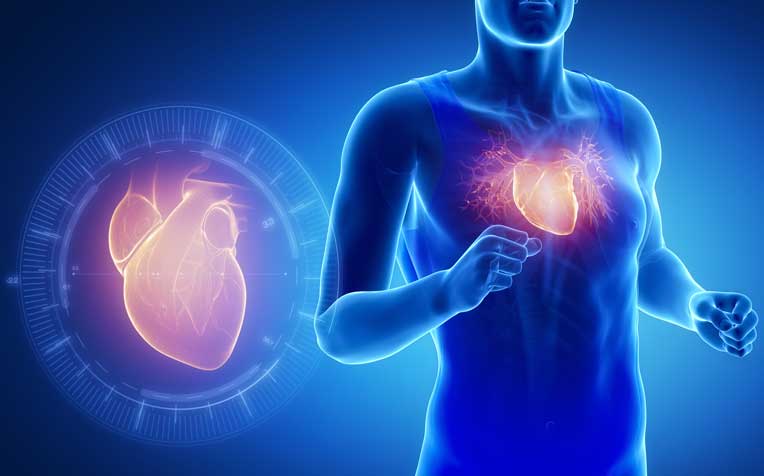
Prevent heart failure by walking 10,000 steps a day and engaging in at least 150mins of moderate-to-vigorous physical activity weekly.
Heart failure is preventable
Heart failure is highly preventable, and many of its common causes can be avoided with simple lifestyle changes.
“There is a lot that we can do to reduce or prevent the risk of high blood pressure (hypertension), diabetes and coronary artery disease,” explains Professor Carolyn Lam, Senior Consultant from the Department of Cardiology at National Heart Centre Singapore (NHCS), a member of the SingHealth group.
“Most of us will be able to lower our risk of developing heart failure if we keep to a healthy lifestyle through a sensible diet and regular exercise.”
11 Ways to prevent heart failure and maintain a healthy heart
1. Maintain a healthy weight
Target to have a BMI of between 18.3 to 22.9 kg/m2, and keep your waist circumferance equal or less than 80cm (for women) and 90cm (for men)
2. Eat a balanced diet rich in fresh fruits and vegetables
Eat 2 servings of fruits and 2 servings of vegetables daily
Eat 2 to 3 servings of meat and alternatives daily (of which half a serving should be from dairy or high-calcium products)
Eat 5 to 7 servings of rice and alternatives daily (of which 2 to 3 servings should be wholegrain products)
Drink 6 to 8 glasses (or 1.5 to 2 litres) of fluid daily
3. Keep your cholesterol, blood pressure and blood sugar levels at healthy levels
| Cholesterol levels | Blood pressure (BP) levels | Blood sugar levels |
|---|---|---|
Total cholesterol: Less than 5.2 mmol/L (200 mg/dL) HDL cholesterol: Equal or greater than 1.0 mmol/L LDL cholesterol: Less than 3.4 mmol/L (130 mg/dL) Triglycerides: Less than 2.3 mmol/L (200 mg/dL) Check with your doctor the levels to set for yourself | Systolic BP: Diastolic BP: Check with your doctor the levels to set for yourself | HbA1c 6.5 7% Pre-meal glucose: 2-Hour post meal glucose: 7.1 10.0 mmol/L Check with your doctor the levels to set for yourself |
4. Avoid trans fats and limit sugars
5. Reduce your salt intake
6. Avoid excessive alcohol intake
Men shoud not drink more than two standard drinks a day, and women, no more than one. A standard alcoholic drink is defined as a can (330ml) of regular beer, half a glass (100ml) of wine or one nip (30ml) of spirit.
7. Quit smoking (if you are still smoking)
See a doctor if you need help to quit smoking.
8. Exercise regularly (engage in regular physical activity)
Target to do at least 30mins of moderate-to-vigorous physical activity daily (or at least 150 minutes of moderate-to-vigorous physical activity per week). If you are not used to exercising regularly, start slow with hitting 10,000 steps a day. Consistency is key.
9. Keep stress under control
Do yoga and meditation to cope with stress. If you need help dealing with anxiety and depression, don't hesitate to seek professional help from trained counsellors.
10. Go for regular medical check-ups
11. Keep chronic conditions in check
If you are currently under medication for chronic medical conditions (such as high cholesterol, high blood pressure or diabetes), be sure to take your medication regularly as stipulated by your doctor. Also, check with your doctor on targets of control, and ask for advice on how you can achieve them if you are having difficulty.
Heart failure in Singapore
Heart failure (HF) is a major health problem in Singapore accounting for around 6,000 hospitalisations annually. Singaporeans suffer from heart failure at the average age of 61, about ten years before Europeans and Americans, reveals a study. The Asian-HF study was carried out involving over 5,000 heart failure patients from 11 Asian countries.
Singaporeans with heart failure were found to have a higher prevalence of three common causes of heart failure — coronary artery disease, high blood pressure and diabetes — compared to other Asians, Americans and Europeans with heart failure. Of the 1,066 heart failure patients from Singapore who participated in the study, 62 per cent had coronary artery disease, 70 per cent had high blood pressure and 58 per cent had diabetes.
Ref: N18
Check out other articles on heart health:
How Does a Heart Attack Happen?
Heart Attack Symptoms in Women Differ from Men. How?
How to Survive a Heart Attack When Alone
Sudden Chest Pains That Can Kill
When Are Heart Palpitations (Fast Heart Beats) Serious?
How a Flu-Like Infection Can Affect the Heart
Heart Murmurs: Causes, Types and Safety Tips
















 Get it on Google Play
Get it on Google Play